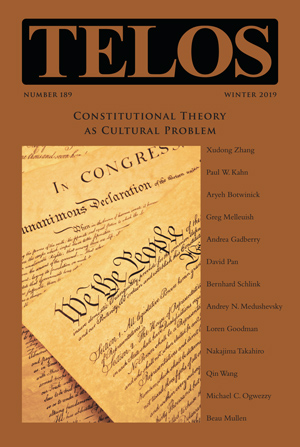Andrey N. Medushevsky’s “Law and Revolution: The Impact of Soviet Legitimacy on Post-Soviet Constitutional Transformation” appears in Telos 189 (Winter 2019), a special issue on constitutional theory. Read the full article at the Telos Online website, or purchase a print copy of the issue in our online store. Individual subscriptions to Telos are available in both print and online formats.
 The systematic investigation of the Russian revolutionary tradition in comparative, historical, and functional perspective provides the opportunity to understand its impact on the creation of the modern world and the contemporary social and political system. This article discusses the meaning, formation, and evolution of the Soviet project—the concept and practice of social and legal reorganization in Russia inspired by Marxist philosophical ideas and fulfilled during the period from the Bolshevik Revolution of 1917 until the collapse of the Soviet regime in 1991. Employing a cognitive theoretical approach in historical studies, the author examines the role of Communist myth in the formation of the Soviet state, the ideological and legal grounds of one-party dictatorship, the nature of nominal constitutionalism, and the role of institutional continuity in the formation of the current political system. He shows the place of the permanent grounds (ideology, nominal constitutionalism, and dictatorial impetus) as well as the place of changing parameters of the project (Soviet, federative, and class-oriented regulation) regarding their formal and informal influence on the political regime’s legitimacy and the cumulative impact on the system’s transformation and failure. In this context, the author discusses the evolution of the legitimating formula of the political regime from Tsarist times to the collapse of the Soviet regime, as represented in ideological programmatic, nominal Soviet constitutionalism (1918, 1924, 1936, and 1977 Soviet constitutions) and changing practices of the social mobilization. That makes possible the general evaluation of the revolutionary heritage and its influence on the current post-Soviet ideological priorities, political system, legal transformation, and prospects for its modernization.
The systematic investigation of the Russian revolutionary tradition in comparative, historical, and functional perspective provides the opportunity to understand its impact on the creation of the modern world and the contemporary social and political system. This article discusses the meaning, formation, and evolution of the Soviet project—the concept and practice of social and legal reorganization in Russia inspired by Marxist philosophical ideas and fulfilled during the period from the Bolshevik Revolution of 1917 until the collapse of the Soviet regime in 1991. Employing a cognitive theoretical approach in historical studies, the author examines the role of Communist myth in the formation of the Soviet state, the ideological and legal grounds of one-party dictatorship, the nature of nominal constitutionalism, and the role of institutional continuity in the formation of the current political system. He shows the place of the permanent grounds (ideology, nominal constitutionalism, and dictatorial impetus) as well as the place of changing parameters of the project (Soviet, federative, and class-oriented regulation) regarding their formal and informal influence on the political regime’s legitimacy and the cumulative impact on the system’s transformation and failure. In this context, the author discusses the evolution of the legitimating formula of the political regime from Tsarist times to the collapse of the Soviet regime, as represented in ideological programmatic, nominal Soviet constitutionalism (1918, 1924, 1936, and 1977 Soviet constitutions) and changing practices of the social mobilization. That makes possible the general evaluation of the revolutionary heritage and its influence on the current post-Soviet ideological priorities, political system, legal transformation, and prospects for its modernization.








